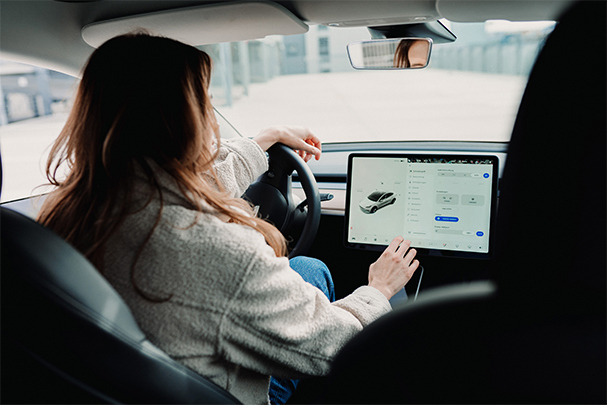
Nationwide Vehicle Contracts address the common misconceptions surrounding electric car's range and shed light on the crucial role of managing range anxiety
Electric vehicles (EVs) have come a long way in recent years, with advancements in technology and infrastructure making them a viable and attractive option for many motorists. However, a lingering concern that often holds people back from embracing this sustainable mode of transport is the fear of running out of charge mid-journey, commonly referred to as "range anxiety." In this comprehensive guide, we aim to address the common misconceptions surrounding electric car range and shed light on the crucial role of miles per kilowatt-hour (kWh) in managing range anxiety.
Myth 1: Electric Cars Have Limited Range
One of the most pervasive myths about electric vehicles is that they have a limited range, making them impractical for long-distance travel. While it's true that early EVs had a more restricted range, advancements in battery technology have significantly improved the driving range of modern electric cars. High-end models can now travel over 300 miles on a single charge, making them suitable for various types of journeys.
Fact 1: Range Varies Based on Model and Battery Technology
The range of an electric car varies depending on the model and the battery technology it employs. Modern EVs use lithium-ion batteries, which offer better energy density and longevity compared to earlier battery types. Factors such as the size of the battery pack, the efficiency of the car's design, and driving conditions also influence the overall range. It's essential to research and choose an electric car that meets your specific driving needs and habits.
Myth 2: Electric Car Range Is Static
Some people believe that an electric car's range remains constant regardless of how it's driven. This misconception often leads to fears of unexpectedly running out of power during a journey.
Fact 2: Driving Behaviour Affects Range
The range of an electric car is not fixed; it's influenced by various factors, including driving behaviour, speed, terrain, and weather conditions. Aggressive driving, high speeds, and frequent acceleration and deceleration can all decrease the range. Driving at a steady pace and employing regenerative braking can help optimize the vehicle's range.
Myth 3: Miles per kWh Is Not Important
Many potential EV buyers overlook the importance of miles per kilowatt-hour (miles per kWh) in managing range anxiety. They might assume that as long as the car has a high overall range, the efficiency measured in miles per kWh is irrelevant.
Fact 3: Miles per kWh Matters
Miles per kWh is a critical metric that provides insight into an electric car's efficiency. A higher miles per kWh value means the vehicle can travel more miles using less energy. Understanding this metric allows you to estimate the real-world range of your EV based on the battery capacity, helping you plan your trips and alleviate range anxiety.
Myth 4: Charging Infrastructure Is Inadequate
Another common misconception is that the charging infrastructure for electric cars is insufficient, leading to concerns about being stranded with a low battery and nowhere to charge.
Fact 4: Growing Charging Network
The charging infrastructure for electric vehicles is expanding rapidly. Governments, businesses, and private individuals are investing heavily in the development of charging stations across cities, highways, and public parking areas. Additionally, home charging solutions are becoming more accessible and affordable. With the growing network of charging points, finding a charging station for your electric car is becoming increasingly convenient and hassle-free, alleviating concerns about inadequate charging options.
Myth 5: Electric Cars Are More Expensive
A prevalent misconception is that electric cars come with a hefty price tag, making them unaffordable for the average consumer.
Fact 5: Decreasing Cost of Electric Vehicles
While it's true that electric vehicles were relatively expensive when they first entered the market, significant advancements in technology and increased demand have led to a decline in production costs. Government incentives, tax credits, and subsidies are also being offered to encourage the adoption of electric vehicles, making them more affordable. Additionally, over time, the lower maintenance and operational costs of electric cars can offset the initial purchase price, making them a financially attractive option for many consumers. The overall cost of ownership is becoming increasingly competitive with traditional internal combustion engine vehicles.
Conclusion
Electric car range anxiety is based on outdated misconceptions. We've shown that electric vehicles are a realistic and eco-friendly choice, countering worries about running out of power with facts about technological progress and expanding charging options.
Understanding miles per kilowatt-hour (miles per kWh) is key to managing any concerns about range. It helps us plan our trips and appreciate the efficiency of modern electric cars. With governments and businesses supporting the shift to electric vehicles, the landscape is rapidly improving, making them a practical option for more drivers.
By accepting the truth about electric vehicles, we move closer to a cleaner and more sustainable future. Electric cars are a crucial part of reducing pollution and aligning transportation with the environment. Let's embrace electric vehicles, driving towards a better world for everyone.
For more information about electric cars, why not check out our Planning Long Journeys with Leased Electric Cars in the UK blog? We also produce a range of weekly blogs on various topics, which can be found in the blog section of our website.
Nationwide Vehicle Contracts are one of the UK's leading car leasing brokers and offer a range of leasing deals to suit every need. To find out more, check out our comprehensive car leasing guides or call one of our experts on 0345 811 9595.

